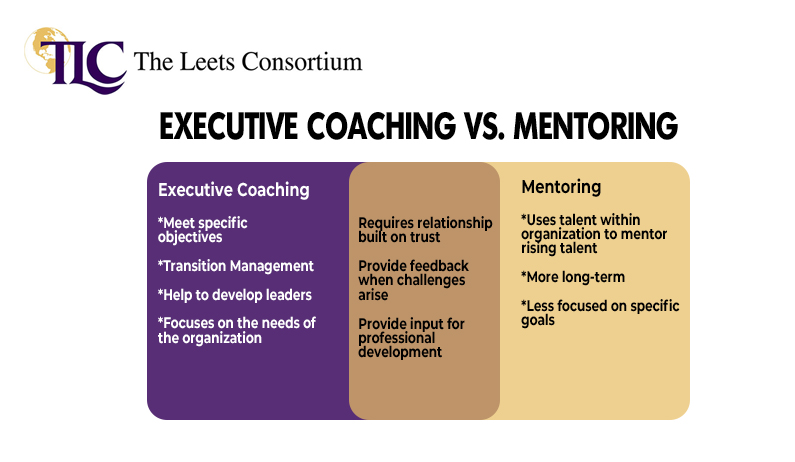What is Executive Coaching and Mentoring?
Coaching | Apr 15, 2021

No doubt you have heard about executive coaching. It is an area of professional development that has flourished in recent years with many high-level business owners, entrepreneurs and executives extolling the benefits of executive coaching and mentoring.
Coaches and mentors provide valuable input for professional development. Mentors and coaches will often share a similar approach and skills utilizing a conversational process to promote sustainable change and the unlocking of an individual’s potential, but coaching and mentoring are not generally defined as the same thing.
Defining Executive Coaching and Mentoring
While an HR professional might recommend both coaches and mentors as part of an executive or leadership development program executives are likely to receive and benefit from coaching and mentoring in slightly different ways.
A mentoring program will tend to use high level executives, managers and leaders within an organization to mentor rising talent. A mentor relationship is likely to be a longer term relationship than a coaching engagement and be less focused on specific goals or development planning. Mentees tend to ask more questions of a mentor than they would of a coach where the coach generally asks the majority of the questions, in order to learn from the mentors expertise and experience.
Conversely organizations will often hire an external coach with a specific coaching certification to work with individuals or executive teams. Executive coaching provides a platform for unleashing potential while working towards specific objectives. Executive or leadership coaching will often start with a process of assessment and a conversation in which the coach provides the opportunity for executives to clarify and focus in on their vision in order to set goals and measurable outcomes for the relationship.
Both coaching and mentoring requires a relationship built on trust and mutual respect and both mentors and coaches can act as a sounding board when challenges or opportunities arise. Coaches in particular will ask thought provoking questions that will get the coachee or mentee thinking in a different way, helping executives tap into their innate skills and abilities as well as developing areas such as their emotional intelligence and relationship building skills. Whereas mentors may be more likely to offer advice and insight based on their own experience and expertise in similar situations.
For this reason mentors tend to be individuals that are further along your chosen path, someone that has got to where you want to be and can offer their skills and experience to help you walk the path. Whereas coaches, although many come from a business background, may not be experts in your specific field. Leadership coaches for example will tend to have broad experience and specific training in leadership skills and tools but they are not there to teach rather to support and facilitate learning and development and the application of skills.
The History of Coaching and Mentoring
Coaching whether it is team coaching or business coaching is a supportive relationship with the focus of improving performance and maximizing potential. This type of relationship built on trust, respect and support has existed since ancient times, and in fact, the word mentor comes from the Greek Myth in which Odysseus’s son Telemachus is supported by a wise old man named Mentor.
The Greeks were also known for providing support to their elite athletes with promising young athletes being given guidance and support from former champions.
Coaching relationships have been seen throughout history both in sporting and academic scenarios and it is thought that the term coach in reference to a person was first used to describe academic tutors that would support students in reaching their desired destination, much like a horse-drawn coach would take you from one place to another.
In a business context there is also a long history of mentoring and coaching in one form or another being used to help individuals develop their talents including master craftsmen tutoring young apprentices in their arts in the middle ages, mentoring, and a trend for companies providing counseling to senior executives in the 50’s and 60’s to help them improve performance and overcome barriers.
Modern coaching stems from the idea that every person has an urge to improve their performance and achieve their full potential and that the internal psychological struggle against limiting beliefs, doubts and fears is as important as the more external struggle of having the physical skills or competencies required for the role. This style of coach mentoring began gaining popularity in the business community in the 70’s and 80’s.
Executive coaches, life coaches and career coaches are all focused on helping an individual fulfill their natural potential as well as achieve specific goals. Many coach certification programs teach the GROW model developed by Alexander and Whitmore. And it was Whitmore’s book, Coaching for Performance, that preceded a rapid rise in the popularity of coaching programs for top executives.
When to Choose an Executive Coach
Investing in a coaching engagement can be an effective way of building human capital and developing talent as well as helping with change or transition management. Many organizations, business owners and executives choose to use coaching to help them meet specific objectives such as career development, leadership development or company expansion.
High level executives may find having a trusted sounding board that is not part of the company invaluable in decision making as well as for challenging them in ways that their colleagues may not feel comfortable in doing.
Coaching engagements should be uniquely tailored to the needs of the organization and executives and offer an excellent return on investment. Many coaches are able to also provide advice from their own many years of expertise so cross into a consultancy or mentoring role.
However there are situations where a mentor or consultant may be more appropriate and so it is always worth having a conversation and looking at the many options available or choosing a coach with a specific skill set that matches the organizational needs rather than just a relevant qualification.
Coaching is also only effective if the client is on board with the process and willing to fully engage and take part. This means that choosing a coach whom you have a good rapport with and feel you can trust and respect is vital for making the most of the engagement and ensuring you achieve your goals.
Ready to learn more about coaching with TLC? Let’s talk! We’d love to give you an assessment free of charge – contact us here.
Subscribe to our Newsletter:
Receive leadership and professional development insights straight to your inbox
How can we support your success?
We’d love to get to know you and learn more about your organization’s leadership development initiatives.

